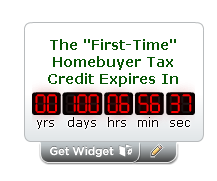NOTE: this is a post from 2010 and this tax credit is no longer available.
If you are planning on taking advantage of the home buyer tax credit, either as a first time home buyer or a "repeat" home buyer (aka "long time resident"), you have fifteen days to be in a binding sales contract with mutual acceptance. This means that both you and the seller have ironed out the negotiations which can sometimes take a few days to agree on…so in reality, you probably have less than 15 days unless you submit the "perfect" offer to the seller and they decide to accept it with no counter offers.
If you are hoping to claim the home buyer tax credit, you should check in with your mortgage professional to make sure that your preapproval is still valid. In the Seattle-Bellevue area, listing agents and sellers expect a preapproval letter to accompany the purchase and sale agreement before they will consider the offer.
Preapproval letters may expire if your paystubs, bank statements or credit report are outdated. The terms stated on the preapproval letter should match with the terms of the offer being presented to the seller. Mortgage rates have been volatile and if your debt to income ratios were "pushed" to the limit, you may or may not be qualifed for what you once were.
If your offer is countered past April 30, 2010 because you didn't have all your ducks in a row with your lender, you may not qualify for the home buyer tax credit.
And before you try to get into a mutual contract before the deadline–it's a good idea to make sure that you actually qualify for the tax credit.
You may be disqualified from the home buyer tax credit if:
- the government has deemed you make too much money–modified adjusted gross incomes up to $125,000 for a single taxpayer, or $225,000 joint, qualify for the full credit. Those with MAGI up to $145,000 for a single taxpayer and $245,000 joint qualify for reduced credit.
- if the purchase price is over $800,000 (better write that offer for $799,950 if your income qualifies).
- if the home being purchased is not going to be your primary residence.
- family members are not eligible (you cannot buy the home ancestors or dependents)
- if the contract is accepted after April 30, 2010
- if the transaction is closing after June 30, 2010
Remember, I'm your mortgage expert for homes located in Washington. I am not a tax expert–please consult your CPA or tax advisor for more information.
 One benefit of FHA insured mortgages is that they are assumable to qualified buyers. This means that if you have an FHA insured mortgage at today’s low rates and you’re selling your home during a higher mortgage rate environment, being able to offer a lower rate to potential buyers could provide a distinct advantage over other competing listings.
One benefit of FHA insured mortgages is that they are assumable to qualified buyers. This means that if you have an FHA insured mortgage at today’s low rates and you’re selling your home during a higher mortgage rate environment, being able to offer a lower rate to potential buyers could provide a distinct advantage over other competing listings.  I recently met with a couple who had relocated to the Seattle area and were ready to make an offer on a home. They’re very qualified with their income stability and enough savings to put a twenty percent down payment on their next home. What surprised them was the credit report.
I recently met with a couple who had relocated to the Seattle area and were ready to make an offer on a home. They’re very qualified with their income stability and enough savings to put a twenty percent down payment on their next home. What surprised them was the credit report. 









Recent Comments